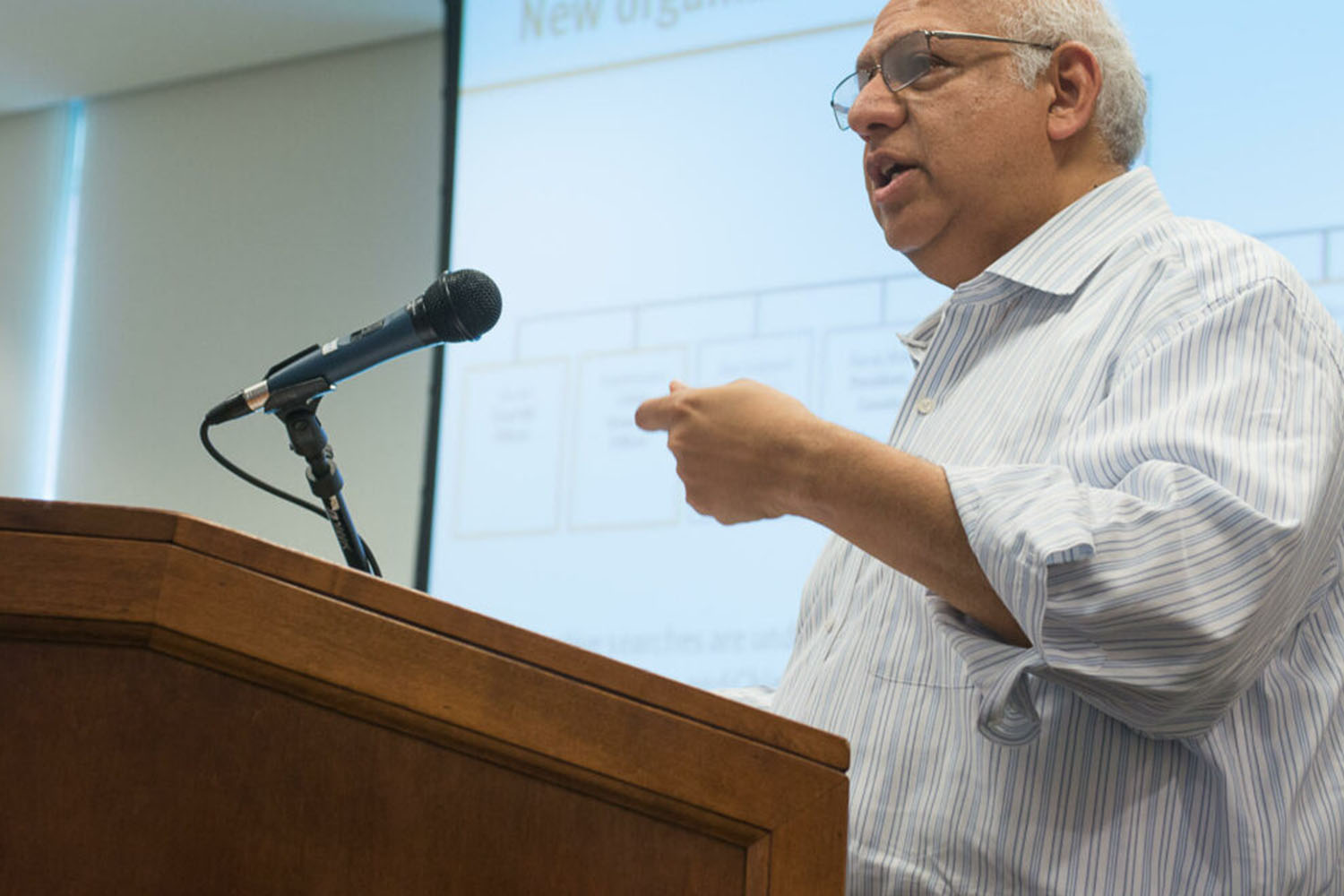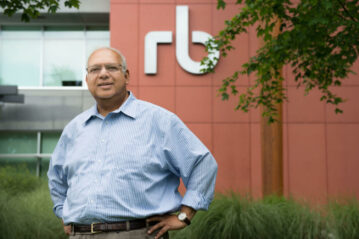Client Perspective: CEO Ravi Saligram of Ritchie Bros. Auctioneers Part 2

Designed to help CEOs and senior executives grow in their leadership, this occasional series offers insights on leadership seldom seen in textbooks. This is the second of a two-part interview. Read part 1 here.
David: There is a sharp increase in public companies in the U.S. separating the role of chairperson and CEO, as is the standard in Europe. Do you favor one approach over the other? What are your insights into optimal board/CEO dynamics when the role of chairperson and CEO is separated?
Ravi: I’ve been on an incredible board at Church & Dwight, and to me it’s a shining example of a great board with amazing board members. It’s also an extremely well-run company, and the market cap has gone from $2 billion to over $14 billion in 12 years. Sometimes I feel that at Church & Dwight, being a board member is like being a Maytag repairman—you keep waiting for the call for help, but it never comes.
Speaking for myself and not for other board members, I feel the Church & Dwight board really has a very good understanding of the role of the board versus the role of management. Jim Craigie is a terrific chairman and CEO who led the company from 2007–2016; in the last two years, it’s been Matt Ferrell, who used to be the CFO and is now carrying on the legacy.
We brought RHR in once to do a project on a board and CEO alignment. That was an inflection point where the board really focused on being strategic and letting management manage. The board must understand very clearly its role and, unless the business is going to hell in a handbasket, not interfere and micromanage.
On the flip side, I’ve also been on boards that have been quite dysfunctional. Boards have to recognize that it is the CEO and management who really drive shareholder value. It’s important for the board to ask, “Do we have the right team, do we have the right strategy, et cetera?” but not try to run the business. The board’s role is to create the right environment for success.
With dysfunctional boards, you’ve got to question, “Does the board really understand its role? And is the composition of the board right?” And then you get to the issue of chairman and CEO. When you’re a rookie CEO, it is good to have a non-executive chairman because the CEO needs to learn the ropes and learn to run the company. In some companies it makes sense to separate the roles. In some companies it doesn’t.
Where it becomes a problem is if the non-executive chairman really wants to be executive chairman and run the company, and this person wants the CEO to be more like a COO or do the bidding of the chairman.
At Ritchie Bros., I have an excellent relationship with our non-executive chairman because she and I are very good at respecting each other’s roles. I know that her job is to manage the board. My job is to run the company. But our jobs are hinged on each other. Communication becomes very important. I speak with her every two weeks. Because we talk a lot, she’s never surprised. Ultimately, she and I are completely aligned on the vision for the company, and there is great chemistry and complementarity. I am passionate and emotional, while she is calm and even-keeled. She makes a great sounding board.
But the CEO communicating with the chairman is not enough. It’s also important to have ongoing communication with individual board members because they’re all independent, and they bring different perspectives.
It has to be in the right spirit of communication and not politicking. You don’t want to create cliques and division in the board, so you must make sure the board is aligned. Your job as CEO is to make sure there is constant communication and alignment.
The last thing is that management sometimes gets frustrated, saying, “If we talked about it at the previous meeting, you should remember.” Board members sit on lots of boards. They come once a quarter. They don’t remember everything.
It’s important that you keep that cadence of communication and think through what you want the board to take away. Always put yourself in their shoes and ask yourself, “What are they trying to achieve?” If you view things through that lens, you can tailor your communications to make sure the board can do its job.
David: You are very close to your immediate and extended family. How do you ensure you are bringing your best self to both work and family?
Ravi: My wife works harder than I do. Without her, I wouldn’t have been able to achieve all that I have, including moving to different countries and changing jobs. She is the eternal optimist and lifts my spirits.
We are two A-plus-type personalities, and it’s trickled down to our daughters as well. In our house, all of us believe that work comes first. If one of our daughters says, “I’ve got to go to this meeting, and I can’t make a family outing,” we say, “We absolutely understand.” It’s just in our DNA.
My daughters are 30 and 29, and we typically do all our vacations together. When we are together, we talk about our lives. My girls and my wife are also great sounding boards for me. And having two amazing daughters and a smart wife has shaped a lot of my views and my quest to address gender diversity in companies.
But while my family and I are in sync with regard to work and life, it can take time for my teams to adapt. They all know that the boss practices what he preaches. Having said that, it is a little unnerving for them when they get an email at 2:00 a.m. I don’t expect people to reply to me at 2:00 a.m., but not everyone understands.
I put a lot of emphasis on caring for people, especially if I know they work hard and do their best. On the other hand, if I feel some of my direct reports or people below are slackers and don’t work hard, they don’t do well with me.
I’m respectful about work/life balance for others, but at senior executive levels, I feel it has to be a proper balance. It can’t be all about life and very little about work. I expect my senior executives to be role models, to be highly committed and passionate, and be truly all-in.
At the end of the day for me, my family comes first. It’s not just my daughters and my wife—my brother is also an important person in my life. He is one of my very best friends and my confidant. He just got promoted to be the chief operating officer of a public company. We are two Indian immigrants, 16 years apart, living the American dream!
I also have a close bond with my sister who lives in India. She has a zest for life and is the most affectionate person I know. She is very important, as are my nieces and nephews, my aunts, my uncles, and my cousins, so there’s a huge extended family. I feel very happy and alive because I don’t at all look at myself as a unidimensional person for whom it’s all about work. Work enables me to do my other pursuits and at the same time engages me on many levels: intellectually, emotionally, and even at a deeper level, since I love building sustainable, thriving organizations. In many ways, I’m very lucky to have such professional and personal fulfillment.


